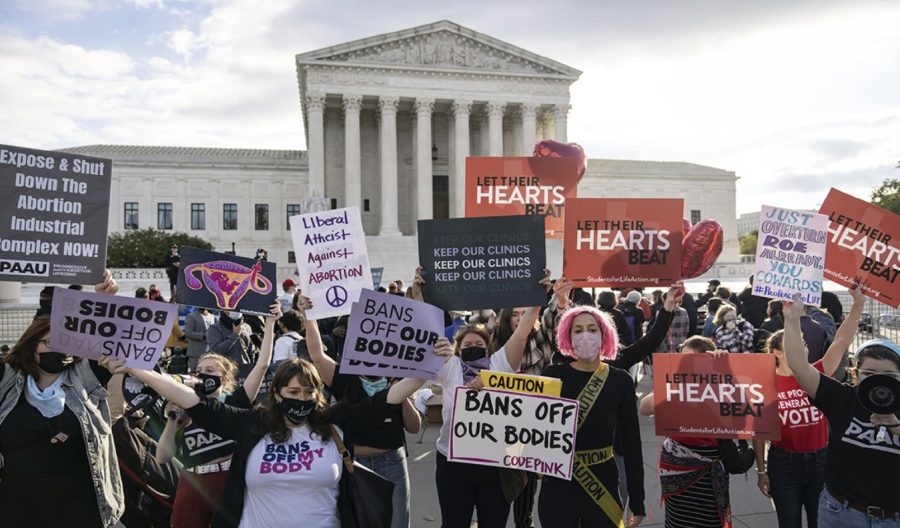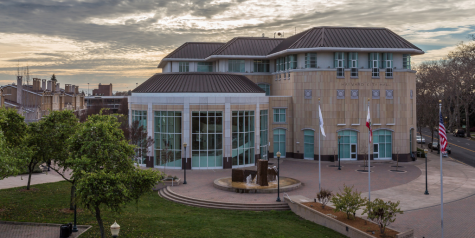Roe v. Wade in Jeopardy?
June 15, 2022
Before Jan. 22, 1973, women were forced to travel to states where abortion was legal in order to terminate a pregnancy safely. Roe v. Wade was a landmark case that ruled abortion bans unconstitutional, arguing that a woman’s right to an abortion is protected by the 14th Amendment of the U.S. Constitution granting their “rights to privacy.”
Since the 1973 decision, experts such as Anu Kumar — the CEO of Ipas, a U.S. based reproductive rights organization whose work focuses on helping women internationally obtain access to abortion — have called Roe v. Wade a “desiccated husk” of a ruling, leaving the law open for interpretation in many conservative states. By 2022, a ripple effect of anti-abortion laws in conservative states led to verdict reconsideration by the Supreme Court, enabling Alabama, Arizona, Arkansas, Michigan, Mississippi, Oklahoma, West Virginia, and Wisconsin, all of which imposed restrictions on the right to abortion. A few states with some of the restrictions include:
– OKLAHOMA: Gov. Kevin Stitt signed a bill that bans nearly all abortions starting at fertilization. The new law, which takes effect immediately, is currently the most restrictive abortion ban in the country.
– FLORIDA: In March, Gov. Ron DeSantis signed into law, a ban on most abortions after 15 weeks of pregnancy. It takes effect on July 1.
– IDAHO: A ban on abortion after six weeks of pregnancy was set to take effect on April 22 but has been temporarily blocked by the Idaho Supreme Court.
– KENTUCKY: Lawmakers overrode the governor’s veto of law, restricting abortion after 15 weeks. A federal judge temporarily blocked the measure.
Nonetheless, an overwhelming majority of Americans, roughly 61 percent, support abortion rights in the U.S., a 2022 Pew Research survey revealed. Massachusetts Nurses Association (MNA) expressed their support of abortion rights, “As union members, nurses, and healthcare professionals, everyone should have equal access to healthcare. No matter where you live, or how much money you have, [those factors] should not determine if you can receive safe, legal abortion services.”
While abortion access in California is unlikely to change if Roe v. Wade is struck down, overturning the case will impact those out of the state, disproportionately affecting women of color. To strengthen reproductive rights, Gov. Gavin Newsom announced a new state amendment that would legally protect the right to abortion, solidifying California as a sanctuary state.
“To protect the right to abortion, we’ll do it ourselves. Women will remain protected here,” Newsom declared. In March, California signed a bill that prohibits state-licensed health care service plans from imposing a deductible, co-pay, or other cost-sharing requirements for all abortions and abortion-related services.
Nevertheless, California does not allow abortions after fetal viability. This means that you have the right to get an abortion for any reason until approximately 6 months after you become pregnant. A woman can still get an abortion after the fetal viability period elapses if the pregnancy puts her health or life at risk.
“Legal experts predicted abortion rights can change through subsequent decisions, even without a complete overturn. That’s why so many states have continued to pass laws contradicting [the Supreme Court ruling],” the MNA stated, adding that “the progress that has been made in the U.S. to broaden and equalize healthcare access should not be halted and reversed.”
Since the Supreme Court first recognized the constitutional right to terminate a pregnancy before viability in Roe, the right to abortion has been a lifeline for generations of people wishing to reach their educational, career, economic, and personal goals. As such, legal abortion is necessary for women’s liberation.
For those who have questions about abortion care contact California State University, East Bay’s Student Health and Counseling Services or Planned Parenthood.

















